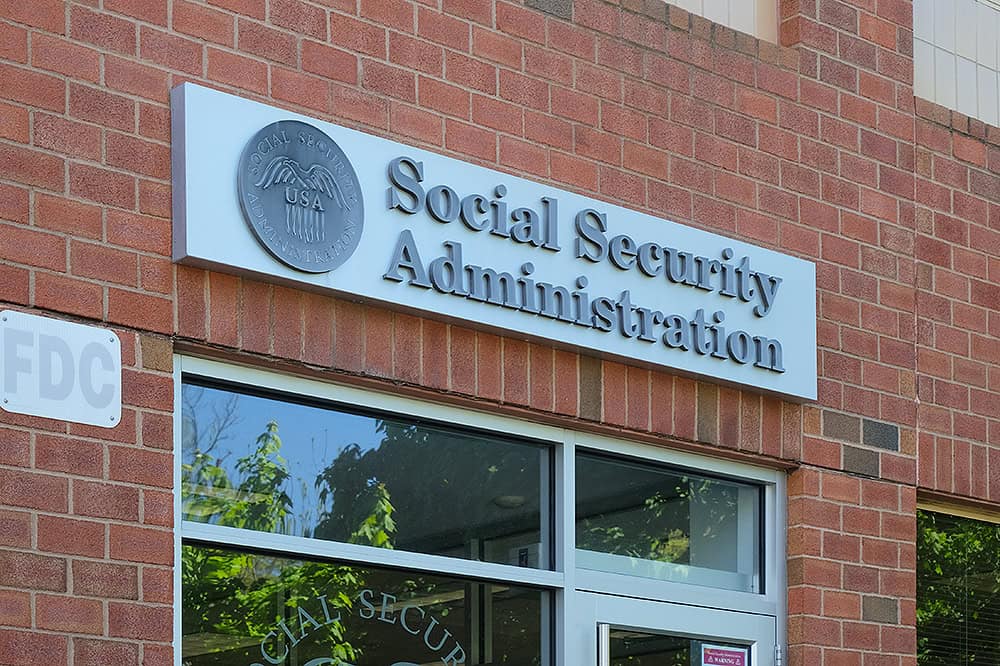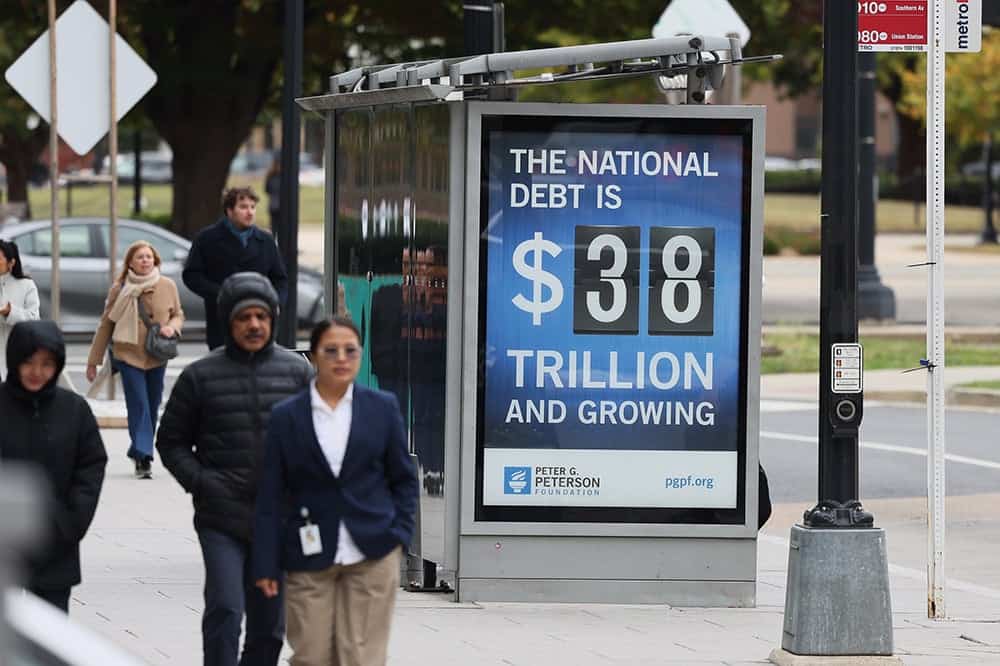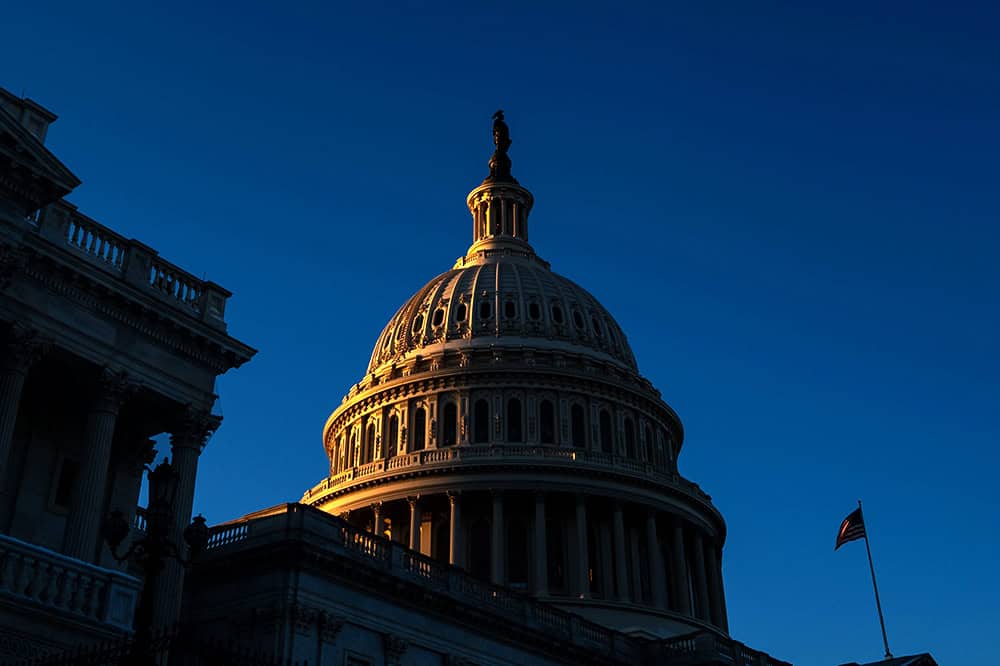US Fiscal Confidence Ties All-Time Low amid Debt Ceiling Debate
The April 2023 Fiscal Confidence Index, Modeled after the Consumer Confidence Index, is 37 (100 is Neutral)
NEW YORK (April 27, 2023) — U.S. Fiscal Confidence dropped five points to tie an all-time low in April as lawmakers consider solutions to the upcoming debt ceiling deadline and our $31 trillion and growing national debt. The nonpartisan Peter G. Peterson Foundation’s latest monthly poll, modeled after the Consumer Confidence Index, is 37 (100 is neutral), highlighting voters’ deep concerns with the state of our fiscal outlook and their desire for policymakers to change course.
Across party lines, voters increasingly believe that the country is on the wrong track when it comes to managing the national debt (27% right direction/69% wrong track, from 32%/64% in March). More than eight-in-ten voters (82%) report heightened concern about the debt and agree that leaders must spend more time addressing it (84%).
Voter believe that the debt should be a top-three priority for the president and Congress (80% agree/15% disagree), including 72% of Democrats, 79% of independents, and 90% of Republicans.
“Fiscal confidence is at an all-time low because voters are concerned about the urgent debt ceiling deadline, as well as the more fundamental underlying issue of the growing national debt,” said Michael A. Peterson, CEO of the Peterson Foundation. “Democratic and Republican voters know that this level of fiscal irresponsibility carries a huge economic risk. Voters understand that we must raise the debt ceiling, but we also need to address the reason we keep hitting it: the growing debt itself. The good news is that there’s a long menu of spending and revenue options available to lawmakers that would move us through the debt ceiling crisis, stabilize our debt, and build a stronger fiscal and economic future for our nation.”
The Fiscal Confidence Index measures public opinion about the national debt by asking six questions in three key areas:
- CONCERN: Level of concern and views about the direction of the national debt.
- PRIORITY: How high a priority addressing the debt should be for elected leaders.
- EXPECTATIONS: Expectations about whether the debt situation will get better or worse in the next few years.
The survey results from these three areas are weighted equally and averaged to produce the Fiscal Confidence Index value. The Fiscal Confidence Index, like the Consumer Confidence Index, is indexed on a scale of 0 to 200, with a neutral midpoint of 100. A reading above 100 indicates positive sentiment. A reading below 100 indicates negative sentiment.
Fiscal Confidence Index Key Data Points:
- The April 2023 Fiscal Confidence Index value tied a record-low of 37. (The March value was 42. The February value was 44.)
- The current Fiscal Confidence Index score for CONCERN about the debt is 30, indicating deep concern about the debt. The score for debt as a PRIORITY that leaders must address is 20, indicating that Americans want elected leaders to make addressing long-term debt a high priority. The score for EXPECTATIONS about progress on the debt is 60. The Fiscal Confidence Index is the average of these three sub-category scores.
- For a description of the complete methodology, see the Appendix below.
The Peter G. Peterson Foundation commissioned this poll by the Global Strategy Group and North Star Opinion Research to survey public opinion on the national debt. The online poll included 1,000 registered voters nationwide, surveyed between April 18, 2023 and April 20, 2023. The poll has a margin of error of +/- 3.1%. The poll examined voters’ opinions on the national debt, political leadership, and America’s fiscal and economic health.
Detailed poll results can be found online at: www.pgpf.org/FiscalConfidenceIndex.
About the Peter G. Peterson Foundation
The Peter G. Peterson Foundation is a nonprofit, nonpartisan organization that is dedicated to increasing public awareness of the nature and urgency of key fiscal challenges threatening America’s future, and to accelerating action on them. To address these challenges successfully, we work to bring Americans together to find and implement sensible, long-term solutions that transcend age, party lines and ideological divides in order to achieve real results. To learn more, please visit www.pgpf.org.
APPENDIX: Fiscal Confidence Index Methodology and Questions
- The Fiscal Confidence Index is released monthly by the Peter G. Peterson Foundation.
- The Fiscal Confidence Index value is based on six questions in three categories.
- As is done with the Consumer Confidence Index, the first step in calculating the Fiscal Confidence Index is determining the “Relative Value” for each question. This calculation is made by taking the positive response for each question and dividing it by the sum of the positive and negative responses. Each question was asked on a four-point scale, and answers were weighted according to intensity, with the strongest responses counting twice as much as the middle responses (“much” better or worse answers count twice as heavily as “somewhat” better or worse answers).
- The scores for the Concern, Priority, and Expectations categories are determined by averaging the scores derived from the two questions in each category.
- The Fiscal Confidence Index value is converted from the Relative Value to place it on a scale on which 100 indicates equal positive and negative sentiment, while values below 100 indicate negative sentiment and values above 100 indicate positive sentiment.
- The questions are as follows:
| CONCERN (30) | |||
|---|---|---|---|
| Thinking about our national debt over the last few years, would you say your level of concern has increased or decreased? ◊ Is that a lot or just a little? |
Apr 2023 | Mar 2023 | Feb 2023 |
| Increased a lot | 54% | 54% | 50% |
| Increased a little | 28% | 28% | 32% |
| Decreased a little | 4% | 5% | 4% |
| Decreased a lot | 3% | 2% | 3% |
| (No change) | 9% | 8% | 9% |
| (Don’t Know/Refused) | 2% | 3% | 2% |
| INCREASED (NET) | 82% | 82% | 82% |
| DECREASED (NET) | 6% | 7% | 7% |
| When it comes to addressing our national debt, would you say things in the United States are heading in the right direction or do you think things are off on the wrong track? ◊ Do you feel that way strongly or just somewhat? |
Apr 2023 | Mar 2023 | Feb 2023 |
| Right direction — Strongly | 8% | 12% | 11% |
| Right direction — Somewhat | 20% | 20% | 20% |
| Wrong track — Somewhat | 27% | 23% | 25% |
| Wrong track — Strongly | 42% | 41% | 40% |
| (Neither/Mixed) | 1% | 1% | 1% |
| (Don’t Know/Refused) | 2% | 4% | 2% |
| RIGHT DIRECTION (NET) | 27% | 32% | 31% |
| WRONG TRACK (NET) | 69% | 64% | 65% |
| PRIORITY (20) | |||
|---|---|---|---|
| Some people say that addressing the national debt should be among the president and Congress’ top 3 priorities. Do you agree or disagree? ◊ Do you feel that way strongly or just somewhat? |
Apr 2023 | Mar 2023 | Feb 2023 |
| Strongly agree | 57% | 57% | 54% |
| Somewhat agree | 23% | 23% | 26% |
| Somewhat disagree | 12% | 11% | 14% |
| Strongly disagree | 3% | 4% | 4% |
| (Don’t Know/Refused) | 5% | 5% | 3% |
| AGREE (NET) | 80% | 80% | 80% |
| DISAGREE (NET) | 15% | 15% | 17% |
| And when it comes to our national debt, do you think it is an issue that the president and Congress should spend more time addressing or less time addressing? ◊ Would you say a lot (more or less) time or just a little? |
Apr 2023 | Mar 2023 | Feb 2023 |
| A lot more time | 54% | 54% | 53% |
| A little more time | 30% | 27% | 29% |
| A little less time | 5% | 7% | 7% |
| A lot less time | 3% | 3% | 4% |
| (The same amount of time) | 4% | 2% | 3% |
| (Don’t Know/Refused) | 3% | 6% | 4% |
| MORE TIME (NET) | 84% | 82% | 82% |
| LESS TIME (NET) | 8% | 10% | 12% |
| EXPECTATIONS (60) | |||
|---|---|---|---|
| And thinking about our national debt over the next few years, do you expect the problem to get better or worse? ◊ Is that much (better or worse) or just somewhat (better or worse)? |
Apr 2023 | Mar 2023 | Feb 2023 |
| Much better | 5% | 8% | 9% |
| Somewhat better | 18% | 21% | 20% |
| Somewhat worse | 32% | 31% | 30% |
| Much worse | 37% | 33% | 34% |
| (No change) | 4% | 2% | 4% |
| (Don’t know/Refused) | 3% | 5% | 3% |
| BETTER (NET) | 24% | 29% | 29% |
| WORSE (NET) | 69% | 64% | 65% |
| And when it comes to our national debt, are you optimistic or pessimistic that the United States will be able to make progress on our national debt over the next few years? ◊ Would you say you are very (optimistic or pessimistic) or just somewhat? |
Apr 2023 | Mar 2023 | Feb 2023 |
| Very optimistic | 6% | 6% | 9% |
| Somewhat optimistic | 35% | 37% | 35% |
| Somewhat pessimistic | 34% | 33% | 33% |
| Very pessimistic | 20% | 18% | 18% |
| (Neither/Mixed) | 2% | 2% | 2% |
| (Don’t Know/Refused) | 2% | 3% | 3% |
| OPTIMISTIC (NET) | 41% | 44% | 44% |
| PESSIMISTIC (NET) | 54% | 51% | 51% |
Further Reading
Lawmakers are Running Out of Time to Fix Social Security
Without reform, Social Security could be depleted as early as 2032, with automatic cuts for beneficiaries.
What Is the National Debt Costing Us?
Programs that millions of Americans depend on and care about may be feeling a squeeze from interest costs on our high and rising national debt.
Interest Costs on the National Debt Are Reaching All-Time Highs
The most recent CBO projections confirm once again that America’s fiscal outlook is on an unsustainable path — increasingly driven by higher interest costs.


